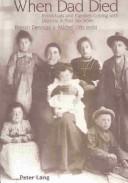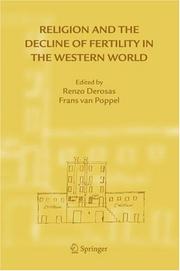| Listing 1 - 5 of 5 |
Sort by
|
Article
Abstract | Keywords | Export | Availability | Bookmark
 Loading...
Loading...Choose an application
- Reference Manager
- EndNote
- RefWorks (Direct export to RefWorks)

ISBN: 3906768236 0820456470 9783906768236 Year: 2002 Publisher: Bern: Lang,
Abstract | Keywords | Export | Availability | Bookmark
 Loading...
Loading...Choose an application
- Reference Manager
- EndNote
- RefWorks (Direct export to RefWorks)
History of Europe --- Sociology of the family. Sociology of sexuality --- anno 1700-1799 --- anno 1800-1899 --- Widowhood --- Single mothers --- Orphans --- Families --- Veuvage --- Mères de famille monoparentale --- Orphelins --- Familles --- History --- Congresses --- Histoire --- Congrès --- Family --- Mères de famille monoparentale --- Congrès --- Widowhood - Europe - History - Congresses. --- Widowhood - Asia - History - Congresses. --- Single mothers - Europe - History - Congresses. --- Single mothers - Asia - History - Congresses. --- Orphans - Europe - History - Congresses. --- Orphans - Asia - History - Congresses. --- Family - Europe - History - Congresses. --- Widowhood - Asia - History - Congresses --- Single mothers - Europe - History - Congresses --- Single mothers - Asia - History - Congresses --- Orphans - Europe - History - Congresses --- Orphans - Asia - History - Congresses --- Families - Europe - History - Congresses --- Congresses. --- DEMOGRAPHIE DE LA FAMILLE --- FAMILLES --- PARENTS ET ENFANTS --- HISTOIRE

ISBN: 9781402051890 1402051891 9786610634828 1280634820 1402051905 Year: 2006 Publisher: Dordrecht: Springer,
Abstract | Keywords | Export | Availability | Bookmark
 Loading...
Loading...Choose an application
- Reference Manager
- EndNote
- RefWorks (Direct export to RefWorks)
The impact of religion on family and reproduction is one of the most fascinating and complex topics open to scholarly research. The linkage between family and religion has received no systematic treatment on a comparative basis, either in the social sciences or in historical studies. This book provides new insights into the relationships between religion and demography during the crucial period of the nineteenth and early twentieth century. Apart from providing a wealth of descriptive information on family life and fertility in different national and religious settings, the major strength of the book lies in its conceptual insights. The book will attract and stimulate readers at the advanced undergraduate or at the graduate level in history, religious studies, women’s studies, family studies, social demography, sociology, and anthropology due to its subject matter (moral issues related to fertility decline and family change played an important role in processes like secularisation, and religious secessions in the19th and 20th century), its analytical approach (all chapters make use of micro-level data on family and family size and use comparable statistical methods specifically suited for these kinds of data), and its theoretical orientation (the chapters explicitly focus on the variety of mechanisms via which religions had an effect on family life and fertility). The book is truly cross-cultural, showing the similarities as well as the differences in the positions of the various churches on matters important for reproduction in Western Europe, the US and Canada in the period 1850-1950. The consideration of the causes of variations in family size in the past provides a refreshing perspective on contemporary effects of religion on reproductive behaviour and the family. "This volume successfully promotes an agenda for research on the complex and diverse historical relationships between fertility, identity, community and religion." Simon Szreter, Fellow of St John's College, Cambridge "These well-researched and lucidly argued papers will provide important reading for all those interested in the religious history of the nineteenth century." Hugh McLeod is Professor of Church History at the University of Birmingham "This is a very valuable new resource for scholars, both established and new, to understand the role of religious institutions in family and demographic behavior and the ways in which those behaviors change across long periods of time." Arland Thornton, Director, Population Studies Center, University of Michigan "This book shows also that modern demographic and social history is able to revive the past in ways unthinkable only a generation ago." Massimo Livi-Bacci is Professor of Demography, University of Florence, and honorary president of the "International Union for the Scientific Study of Population".
Fertility, Human --- Human reproduction --- Religion and sociology --- Religious aspects --- Fertility, human --- Human reproduction. --- #SBIB:316.356.2H3621 --- #SBIB:316.356.2H1120 --- #SBIB:314H150 --- #SBIB:314H230 --- Gezinssociologie: vruchtbaarheid: Westers maatschappijen --- Historische demografie en demografische historiek: algemeen --- Fertiliteit: algemeen --- Fécondité humaine --- EPUB-LIV-FT LIVSOCIA SPRINGER-B --- Social sciences. --- Religion. --- History. --- Sociology. --- Demography. --- Psychotherapy. --- Counseling. --- Social Sciences. --- History, general. --- Religious Studies, general. --- Sociology, general. --- Psychotherapy and Counseling. --- Sociology of religion --- Sociology of the family. Sociology of sexuality --- Demography --- Fertility, Human. --- Religion and sociology. --- Religious aspects. --- Religion and society --- Religious sociology --- Society and religion --- Sociology, Religious --- Sociology and religion --- Sociology --- Human fertility --- Natality --- Infertility --- Sociologie religieuse --- Reproduction humaine --- Aspect religieux --- Applied psychology. --- Historical demography --- Social sciences --- Population --- Vital statistics --- Applied psychology --- Psychagogy --- Psychology, Practical --- Social psychotechnics --- Psychology --- Religion, Primitive --- Atheism --- God --- Irreligion --- Religions --- Theology --- Annals --- Auxiliary sciences of history --- Human physiology --- Reproduction --- Reproductive health --- Reproductive rights --- Gezinssociologie: historische studies over het gezin voor 1900 --- Counselling --- Helping behavior --- Psychology, Applied --- Clinical sociology --- Interviewing --- Personal coaching --- Social case work --- Therapy (Psychotherapy) --- Mental illness --- Mental health counseling --- Social theory --- Treatment --- Human reproduction - Religious aspects.
Digital
ISBN: 9781402051906 Year: 2006 Publisher: Dordrecht Springer
Abstract | Keywords | Export | Availability | Bookmark
 Loading...
Loading...Choose an application
- Reference Manager
- EndNote
- RefWorks (Direct export to RefWorks)
Religious studies --- Sociology of the family. Sociology of sexuality --- Sociology --- Demography --- History --- sociologie --- demografie --- geschiedenis --- godsdienst --- familie
Book
ISBN: 9781402051906 Year: 2006 Publisher: Dordrecht Springer Netherlands
Abstract | Keywords | Export | Availability | Bookmark
 Loading...
Loading...Choose an application
- Reference Manager
- EndNote
- RefWorks (Direct export to RefWorks)
The impact of religion on family and reproduction is one of the most fascinating and complex topics open to scholarly research. The linkage between family and religion has received no systematic treatment on a comparative basis, either in the social sciences or in historical studies. This book provides new insights into the relationships between religion and demography during the crucial period of the nineteenth and early twentieth century. Apart from providing a wealth of descriptive information on family life and fertility in different national and religious settings, the major strength of the book lies in its conceptual insights. The book will attract and stimulate readers at the advanced undergraduate or at the graduate level in history, religious studies, women's studies, family studies, social demography, sociology, and anthropology due to its subject matter (moral issues related to fertility decline and family change played an important role in processes like secularisation, and religious secessions in the19th and 20th century), its analytical approach (all chapters make use of micro-level data on family and family size and use comparable statistical methods specifically suited for these kinds of data), and its theoretical orientation (the chapters explicitly focus on the variety of mechanisms via which religions had an effect on family life and fertility). The book is truly cross-cultural, showing the similarities as well as the differences in the positions of the various churches on matters important for reproduction in Western Europe, the US and Canada in the period 1850-1950. The consideration of the causes of variations in family size in the past provides a refreshing perspective on contemporary effects of religion on reproductive behaviour and the family. "This volume successfully promotes an agenda for research on the complex and diverse historical relationships between fertility, identity, community and religion." Simon Szreter, Fellow of St John's College, Cambridge "These well-researched and lucidly argued papers will provide important reading for all those interested in the religious history of the nineteenth century." Hugh McLeod is Professor of Church History at the University of Birmingham "This is a very valuable new resource for scholars, both established and new, to understand the role of religious institutions in family and demographic behavior and the ways in which those behaviors change across long periods of time." Arland Thornton, Director, Population Studies Center, University of Michigan "This book shows also that modern demographic and social history is able to revive the past in ways unthinkable only a generation ago." Massimo Livi-Bacci is Professor of Demography, University of Florence, and honorary president of the "International Union for the Scientific Study of Population".
Religious studies --- Sociology of the family. Sociology of sexuality --- Sociology --- Demography --- History --- sociologie --- demografie --- geschiedenis --- godsdienst --- familie
| Listing 1 - 5 of 5 |
Sort by
|

 Search
Search Feedback
Feedback About UniCat
About UniCat  Help
Help News
News